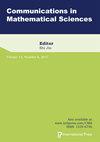论冷等离子体方程仿射解的特性
IF 1.3
4区 数学
Q2 MATHEMATICS, APPLIED
引用次数: 2
摘要
我们研究了冷等离子体平面振荡方程的仿射解,在静电假设下,这些方程对应于排斥情况下的欧拉-泊松方程。研究证明,冷等离子体方程的零平衡态在所有仿射解类中都是不稳定的,无论是有静电假设还是没有静电假设。研究还表明,对轴对称静电解的任意扰动都会导致有限时间爆炸。本文章由计算机程序翻译,如有差异,请以英文原文为准。
On the properties of affine solutions of cold plasma equations
We study the affine solutions of the equations of plane oscillations of cold plasma, which, under the assumption of electrostaticity, correspond to the Euler–Poisson equations in the repulsive case. It is proved that the zero equilibrium state of the cold plasma equations, both with and without the assumption of electrostaticity, is unstable in the class of all affine solutions. It is also shown that an arbitrary perturbation of an axially symmetric electrostatic solution leads to a finite time blow-up.
求助全文
通过发布文献求助,成功后即可免费获取论文全文。
去求助
来源期刊
CiteScore
1.70
自引率
10.00%
发文量
59
审稿时长
6 months
期刊介绍:
Covers modern applied mathematics in the fields of modeling, applied and stochastic analyses and numerical computations—on problems that arise in physical, biological, engineering, and financial applications. The journal publishes high-quality, original research articles, reviews, and expository papers.

 求助内容:
求助内容: 应助结果提醒方式:
应助结果提醒方式:


